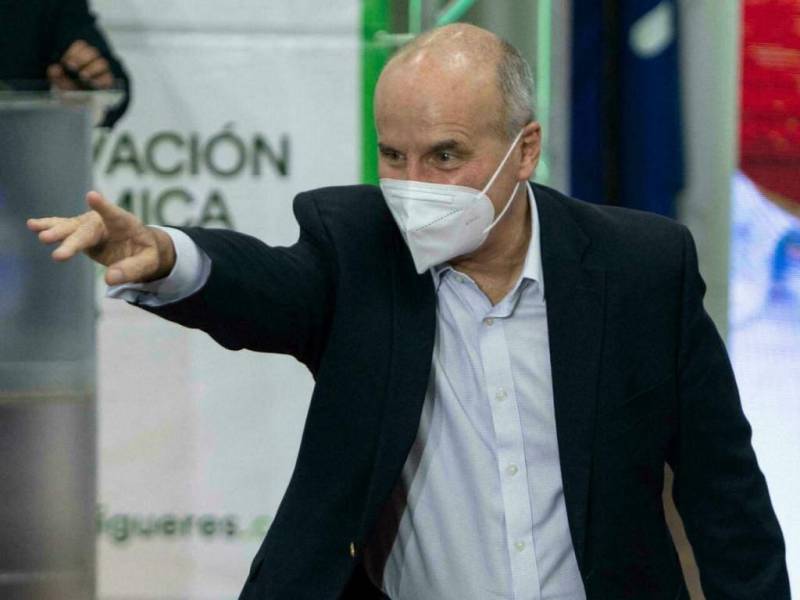Costa Rica’s presidential candidates move to the beat of TikTok to impress undecided

San Jose Costa Rica- Jose Maria Figueres He is a former president of Costa Rica Who aspires to return to the presidency of this Central American country in the February 6 elections. Among his campaign tools: Tiktok.
Former President (1994-1998), 67, from National Liberation Party (PLN, center left), which leads in the polls, has left its comfort zone and is now posting barely political content on the social network most popular with young people.
There he posted videos driving a sports motorcycle, rapping and even shooting himself to stop a penalty kick on a soccer field. Everything approaches 40.8% of respondents registered in the latest national survey of Center for Research and Policy Studies of the University of Costa Rica (CIEP-UCR).
Read: The Woman Who Googles When Consulting an AMLO Girlfriend
“I do my first apprenticeship and I don’t treat it like young people, but I study it, I see it and it attracts me. Through his line, connections will continue in the world of social networks,” Figueres told AFP.
The FLN candidate tops the list with 15% of preference, according to a CIEP-UCR poll, followed by Lisbeth Saborio, a 61-year-old lawyer who is running for Christian Social Unity Party (PUSC, center right), by 13.7%; and Fabrizio Alvarado from New Republic Party (PNR, right) by 10.6%.
With a rhetoric from the far right and radical change, Elie Finzakaged 56 years Liberal Progressive Party (PLP)which only garners 2.5% of intent, also aspires to gain power in Costa Rica by promoting itself on TikTok.
Feinzaig has posted a video of him circling with his arms outstretched to simulate a helicopter, referring to a family joke in his name.
See: A woman locks her son in the trunk of a car to be tested for covid-19
“The goal is to be able to connect with a young segment that prefers the short, short and quiet video format and wants to understand our proposal in order to make the voting decision,” Finzaig told AFP.
Both Figueres and Finzaig confirmed that they have never used TikTok, a digital app that originated in China and has 700 million users, 35% of whom are between the ages of 19 and 29, according to the social network itself on its website.
Saborio and candidates José Maria Vilalta (Front Amplio, left, 7.6% of intent), Rolando Araya (Costa Rica Gusta, right) and Wilmer Ramos (Citizen Movement Party, center left) also conducted experiments on the social network with political and entertainment content the latter two having less From 1% of preferences.
no win
Esteban Mora, a political and data analyst on social networks, estimates that the efforts of candidates on TikTok are futile and will not make a difference among voters.
“If we go to the data, the majority of voters are over 34 years old, which means that investing in TikTok is a mistake (…). They are not convincing anyone,” the specialist argued.
Although images such as the image of Figueres dancing with the Costa Rican singer Toledo or the Vinzaig human helicopter have circulated, Mora downplays the impact it might have.
Attention: Video: They confirm the appearance of two angels in Telica, Olancho
“You can have entertainment, but that doesn’t mean you’re going to vote for them. Entertainment is fickle and you have a two to three minute attention span. It doesn’t generate loyalty,” he explained.
The candidate must generate confidence. People do not vote for a candidate, but vote for themselves, that is, they must be representatives. By doing so, they harm their credibility, their image and their brand.”
But Figueres justified the publications: “Tik Tok is an extraordinary revolution to be able to express ourselves in a spontaneous, free, and often pleasant way, because life needs more smiles and happiness.”
+ Uganda bans women from traveling in the cabin
According to Costa Rican legislation, if neither candidate receives 40% of the vote, a second round will be called on April 3, with the first two places.
Given the fragmentation of the supply and because the applicant does not exceed 20% of intent, the above-mentioned CIEP-UCR survey expects that there will be a ballot. There are 25 applicants, but only seven scored more than 2% of the enrollees.
On the other hand, in the last six elections (since 1998) in Costa Rica, where voting is not mandatory, abstentions were more than 30%, although according to the survey, 86% are willing to vote.
The number of voters in the electoral register was 3541908, according to the number of voters The Supreme Electoral Tribunal (TSE).
Also: German woman on trial for joining Islamic State as a teenager

“Professional problem solver. Subtly charming bacon buff. Gamer. Avid alcohol nerd. Music trailblazer.”




:quality(75)/cloudfront-us-east-1.images.arcpublishing.com/elcomercio/6NEH6FMKYBCU7JJWZ5GVRZKTRM.jpg)
/thumbs.vodgc.net/1-14-FnXFWZ1684253239488_1080P.jpg)



